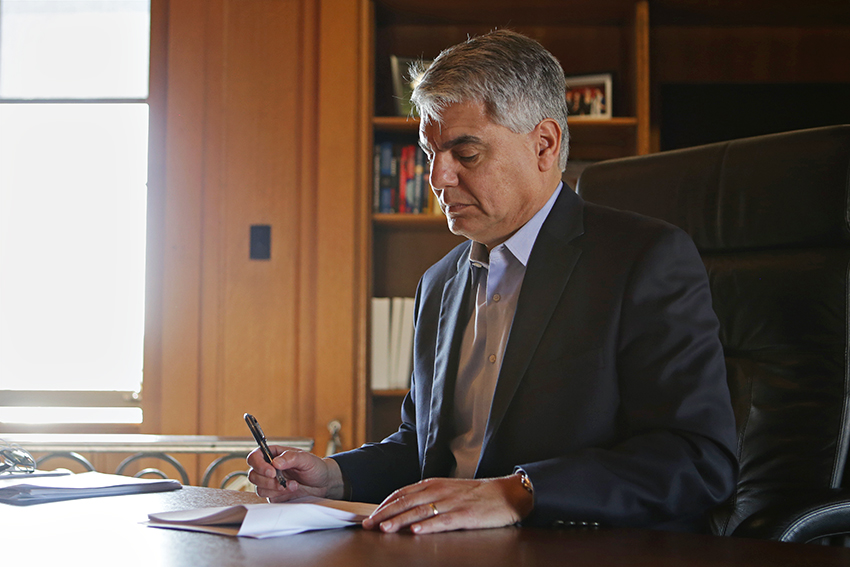He saw the numbers tattooed on his father’s arm for the first time when he was eight years old.
Before then, he did not know his father bore the permanent remnants of war under his sleeves: an arm marked by Nazi soldiers at the entrance to Auschwitz and an arm badly broken during a conflict with a concentration camp guard that never truly healed. UT President Gregory Fenves did not know about the horrors of the Holocaust until the day he discovered his own father was a survivor.
Publicly sharing his father’s story for the first time last month, Fenves opened up to an audience of over one thousand when he accepted the Holocaust Museum Houston’s Guardian of the Human Spirit Award on behalf of UT. The University received the award for contributing scholarships to the museum and its overall educational impact.
“My father’s a Holocaust survivor,” Fenves said in an interview with The Daily Texan on Friday. “It’s never been a secret, but it’s always been something important to me and important to the family … When I became president, this felt like a good time to tell people my family’s story, my father’s story.”
Steven Fenves grew up in Yugoslavia. When he was nine years old, his home fell under German occupation. He and his family were taken to Auschwitz, where he remained for five months before the Polish underground smuggled him to a new camp.
A few years later during a forced march to Buchenwald, Steven Fenves was attacked by a guard, escaping with a badly broken arm. When he came to the next day, he had been rescued by American soldiers, but the fissures in his arm and the psychological impact of World War II would last forever. At age 13, Steven Fenves was a refugee of war.
“I think about how his arm is still broken, from that forced march, how it never really healed,” Fenves said during his acceptance speech at Holocaust Museum Houston. “There is a part of him that will always be shaped by the horrific experiences he endured as a boy. That will never fully heal.”
Fenves said he was able to visit Germany with his father in 1995 and retrace his forced march to Buchenwald. Together, they stood in the spot where Fenves said he stood face to face with evidence of the evil he had heard so much about for the first time.
Twenty-two years later, they stood together in remembrance again, when Fenves dedicated the Guardian of the Human Spirit Award to his father and brought him on stage.
“I wasn’t sure how he would react to me getting this award and talking about it,” Fenves said. “It was a uniquely moving and personal moment. And we were sharing that with over one thousand people in the ballroom.”
Surrounded by wooden bookshelves stacked with leather-bound books in his office last week, Fenves emphasized the importance of education in preventing modern hatred in the nation and on the campus.
“(Today’s intolerance is) very disturbing,” Fenves said. “And I think it’s essential that people recognize it and talk about it and learn about it so that they can be aware, and make sure that the values of tolerance and inclusion continue to be important for everything that we do.”
Upon being asked if his father’s history has affected the way he leads the University and his life, Fenves was hesitant.
“I’m not naturally a contemplative person that thinks about it that way,” Fenves said. “Anybody, whether they’re directly related or have studied the history of hatred that’s led to genocide, has to be aware of the factors that can lead a society or country down that path … So the answer is yes, I believe it has.”





















